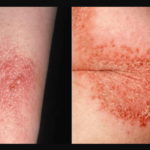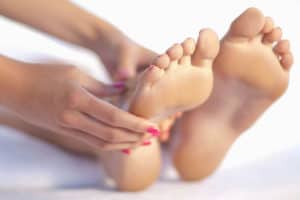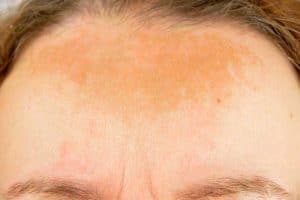So you’re suffering from frustrating, never-ending itchy skin, and you’re also taking birth control. You’ve done a lot of research as to what is causing the itch but are not fully sure.
Can birth control cause itchy skin? Birth control, in the form of a pill or an IUD, can cause itchy skin and many other side effects. In the long run, other side effects include acne, eczema, gum recession, and blood clots. These problems are largely due to hormonal changes and nutrient deficiencies caused by the pill.
Read on to learn more about birth control itchy skin, what causes it, as well as treatments to avoid itchy skin and other side effects from the pill.
Hormonal Birth Control Affects Your Skin
I first want to say that I’m not throwing judgment on anybody who takes birth control. This is just an explanation of my perspective for the people who have been worried about birth control.
Hormonal birth control regulates the change in hormone levels during a woman’s cycle by using different types of synthetic hormones that match the estrogen and progesterone levels that are naturally produced in a woman’s body. It is messing with a body’s natural chemistry, the natural signals.
So just the simple fact alone that it’s messing with your hormones regulating your period chemically, and is blocking signals, is something that is very dangerous.
I believe that pharmaceutical drugs of any kind are going to affect your ability to have the best skin you can possibly have. This is due to the toxic effects these drugs have on the liver, kidney, gallbladder, and the small and large intestine.
I’ve seen clients who were using some sort of birth control method, antidepressants, or some other pharma drug, and when their doctor slowly weaned them off those drugs during the healing process, there was a notable difference in the improvement of their skin.
The same applies when using cortisone cream or steroid cream on eczema or dermatitis. The cortisone cream wears out the skin over time, thins the skin, and can cause red skin syndrome if overused. When you get off of it, what happens is you start to have withdrawal symptoms. Your body needs to detox from the drug as well as heal the skin. This makes it much more challenging.
You need to talk to a doctor and get a plan to become totally pharmaceutical drug-free. Question your doctors. Ask them what this drug does, what are the serious side effects, show me the research, show me the literature.
Be your own advocate for your health. Some doctors are awesome, and some are really busy and will treat you like a number on their chart.
You must be an advocate for yourself, ask questions, and don’t let any dermatologist or doctor push pharma drugs on you. Some may help the symptom sometimes, but overall, pharmaceutical drugs will destroy your health, and I believe that healing the body and curing skin disease easily will be much harder while on them.
The good news is that if you are on birth control or some other pharmaceutical drug, a very clean, cleansing diet and lifestyle protocol are that much more important.
If your doctor says there’s no way you’re getting off this drug, then you’ll need to focus your energy as much as possible on being the healthiest you can be. This will help avoid getting an unwanted serious side effect from birth control or other pharmaceutical drugs.
Also, for an excellent female condom, take a look at our top pick, the FC2 Female Condom:
Click here to see it on Amazon.
Birth Control Itchy Skin is a Side-Effect, Not an Allergic Reaction

Other than latex condoms or certain spermicides, it is very rare for a woman to have an allergic reaction to any form of birth control, including oral contraceptives. The research shows that less than one in one thousand women have an allergic reaction to hormonal birth control.
An allergic reaction is when your body recognizes something as foreign, makes an antibody to attack it, and this causes a process that can cause itching, hives, low blood pressure, trouble breathing, and even blacking out.
It is rare to be allergic to an oral contraceptive because the birth control hormones are very much like your own hormones, and it is unlikely you will be allergic to your own hormones.
That being said, oral contraceptives sometimes have dye or colors in them, and an allergic reaction can be an unwanted serious side effect to these dyes, not so much the hormones.
Or some brands, such as Depo-Provera, include other ingredients such as a carrier or liquid that you could be allergic to and cause itching.
So an allergy to birth control is not normal, but side effects are normal. Side effects happen to women because the hormones in either the pill or the hormonal IUD alter some parts of their bodies.
Estrogens and progestins, the other hormone that is often in birth control, do change your body and how it regulates and manages itself. That happens to you in your natural hormonal cycle and will also happen when using birth control.
So when you are experiencing birth control itchy skin, headaches, nausea, mood changes, skin changes, etc., these are side effects, not an allergic reaction.
11 Other Side Effects of Birth Control

I now want to share with you 11 other side effects of taking hormonal birth control, other than the birth control itchy skin. If I could turn back the time, I would have never started taking them. It was a big mistake for me when I was younger.
Hopefully, this list will convince you to stop taking the hormonal birth control pill if you’re on it now, or if you are considering you might start taking it, or if you are being pressured by your mom or your doctor to start taking it, then please do research and think of it well before you do.
1. Causes Nutrient Deficiencies
The first main side effect, and why I am so against the birth control pill and one of the main reasons why it damages the body so much is that it actually causes nutrient deficiencies.
The most problematic nutrient deficiencies it creates are a deficiency in folate, b6, b12, zinc, and vitamin C. These five nutrients are majorly important for your health, and if you are going to take the birth control pill, you will be low on all these nutrients.
In the 1980s, birth control pills came with a warning that you need to take extra vitamin b6 to make up for the vitamin deficiencies that the pill causes. Since then, that warning has totally disappeared from the drug instructions, and nobody even talks about it anymore.
But the drugs haven’t changed. They still deplete your nutrients, including the important ones. If you don’t want to stop taking the birth control pill, then at least take the extra nutrients to replenish them.
To learn more about how nutrient deficiencies relate to itchy skin, see our post: What Vitamin Deficiency Can Cause Itching?
2. Increases Risk of Breast Cancer
Side effect number two is that birth control pills increase the risk of breast cancer. An explanation for this is very simple. The pill actually gives you higher estrogen levels, and most breast cancers are estrogen dominant, so that’s why it increases breast cancer.
For me personally, this is an important one because my mom had breast cancer, and that’s why I was really worried about this particular side effect.
3. Causes Hormonal Imbalances
Side effect number three of the birth control pill is that it causes hormonal imbalances. Precisely, I’m referring to something called estrogen dominance. Birth control pills have estrogen, but also progestin, which is a kind of synthetic progesterone.
The problem with this is that you get a lot of this extra estrogen in your body and also get varying progesterone levels. Because the body gets the synthetic one, it stops producing a natural one, but the synthetic one just doesn’t work as well as the natural one.
What ends up happening in a lot of cases is that you get too much estrogen and not enough progesterone. Another example may be that you get normal progesterone levels, but estrogen levels could be way too high.
That’s basically what estrogen dominance is and so many women, especially in the West, currently have estrogen dominance.
This leads to a lot of different symptoms like sore breasts, breast tenderness, breast cancer, chest pain, skin changes, yeast infections, and heavy periods. Breast tenderness especially is cited by many women as being an issue of too much estrogen.
Sore breasts, breast tenderness, chest pain, yeast infections, skin changes, and heavy periods are all linked to estrogen dominance, including acne.
4. Causes Copper Toxicity
Side effect number four of birth control is copper toxicity, and this is very much linked to the first reason, which is nutrient deficiencies. There are two reasons for that.
First of all, when you take excess or extra estrogen, high estrogen levels actually increase your body’s copper levels or makes your body retain copper more easily.
Also, zinc and copper are antagonists, which means that they move in the opposite direction. So if you get more zinc, then you’ll get less copper, and vice versa.
If you are low in zinc because of the birth control pill, then you will naturally start collecting more and more copper. A body with too much copper is a body with a lot of problems.
Copper toxicity leads to yeast infection, chest pain, breathing problems, mood swings, excessive water retention, and many more issues. Excess copper in your body is just something you do not want to have.
5. Causes Low Stomach Acid
Side effect number five is that birth control pills cause low stomach acid, and that’s mainly because of zinc deficiency. Zinc is very important for the production of stomach acid.
If you take birth control pills for a while, your body will start producing less and less stomach acid. This can lead to chest pain, yeast infection, skin changes, and other complications.
With low stomach acid, it’s really difficult to digest foods. Next, you start getting things like food intolerances, fatigue after eating, depression, and constipation. These are all problems that can occur if you get too low on stomach acid.
6. Causes Psychological Imbalances
Reason number six is that birth control pills so often cause all kinds of psychological disorders like depression. This is very close to my heart because that’s what happened to me. I experienced anxiety, panic disorders, and all kinds of sleep disorders.
These disorders are all very much linked to the birth control pill. Again the nutrient deficiencies caused by the pill are some of the most serious side effects.
The pill leads to deficiencies in critical nutrients such as folate, zinc B complex, and b12. They’re all necessary for the proper functioning of your brain and the neurotransmitters in it.
7. Causes Gum Recession
Reason number seven you should reconsider taking the pill is that it causes or at least exacerbates gum recession and possibly also tooth decay. This gum and teeth issue is again linked to mineral deficiencies.
Zinc is very important for healthy gums, healthy teeth, and strong enamel. When your zinc starts getting lower, you basically get more and more gum recession first, and then also tooth decay.
There have been oral contraceptive studies that show that the start of taking the birth control pill is very closely linked to an increase in gum recession.
When I first heard about this, I was thinking to myself, why in the world did I ever start taking birth control pills. I think if I didn’t take it, perhaps my gums would not be as recessed as they are today.
8. Masks Problems, Allowing Them to Get Worse
Reason number eight is a very important one for any woman who’s serious about their fertility and health. The problem with birth control pills is that they’re so often used for masking all kinds of female problems instead of actually solving them.
What happens is that a woman takes birth control pills for 10 years, or maybe even 20 years, without sorting these problems, just masking them.
Sooner or later, these problems catch up, and they evolve into something way more serious like infertility, breast cancer, womb cancer, endometriosis (defective tissue growth), or polycystic ovary syndrome. So much time has passed without addressing the real issues.
It isn’t impossible to fix these issues, but it’s going to be so much more difficult to treat them after ignoring them. Masking it just doesn’t make sense.
I want to share a quote that really resonates with me. I think it explains my point very well:
“Giving birth control pills and other medications to women to regulate their periods, improve their fertility, or enhance their sex drive is akin to putting a piece of tape over the flashing indicator light on the dashboard of your car and pretending you have addressed the engine problem rather than looking under the hood and dealing with the underlying issue.”
– Christian Northrup, MD, author of “Women’s Bodies, Women’s Wisdom”
I couldn’t agree with this statement more. Another thing that kind of goes with this is that so often, birth control pills totally kill a woman’s sex drive. This definitely had that effect on me, too, and it’s just sad.
9. Worsens Skin in the Long Term
Reason number nine is that the birth control pill will eventually, with prolonged use, make your skin less healthy. So even though for some women, it actually improves skin at the beginning, in the long term, because of all the different nutrient deficiencies, it will make skin worse.
It will get dry or too oily. It will be imbalanced. It may start peeling. You’ll start being more prone to infection. You can have rebound acne breakouts.
As mentioned earlier in this post, itching is a side effect of birth control pills. When I get asked, ‘can birth control make you itchy’? I have to stress a big yes, although some just won’t believe me.
I experienced it myself; I had a persistent, never-ending itch all over my body that just didn’t go away. Some days I felt like I could tear my skin off just to relieve from the itch. So it’s just not worth it.
All these skin issues are generally due to hormonal changes and also due to the nutrient deficiencies like zinc, folate, and B vitamins. These are extremely important for healthy skin.
Also, if you have acne, and are considering taking the pill for short-term improvement, look for the reasons for the cause root cause of the acne instead. Don’t try to mask it with the pill because you’re going to pay for it later.
10. Increases Risk of Blood Clots
The last reason, reason number ten, for reconsidering the pill is that it increases the risk of blood clots. This is mainly because of the low folate because folate is responsible for the thickness of blood in a body.
This is a huge risk, especially for someone who has a family history of clots or heart disease. This is a really serious thing to consider.
11. Hair Loss
When it comes to the hair and scalp, birth control pills can cause itchy skin on the scalp, as well as hair loss. Birth control pills make the hair go from the growing phase to the resting phase.
This process is called telogen effluvium and can lead to significant hair loss, including chunks of hair falling out. If hair loss or baldness runs in your family, birth control can certainly speed up your own hair loss.
Alternatives to the Birth Control Pill
There are several alternatives to the pill that may lead to fewer side effects; however, they all come with their own pros and cons. Three of these alternatives include condoms, diaphragms, and the ring.
Condoms
Both male and female condoms are the only types of birth control that will help protect against diseases such as HIV or STIs. If you are using other birth control methods, it’s still a good idea to use a condom to avoid infections. They are low-cost and easy to find and come in many textures, shapes, flavors, styles, etc.
There are little to no side effects to condoms except that some people are allergic to the latex in them. But this can be avoided by using condoms in other materials such as polyurethane, polyisoprene, lambskin, or nitrile. A lubricant can also be used to decrease irritation.
The biggest disadvantage to using a condom as a birth control method is that there is a risk it could tear during sex.
This can leave you at the risk of becoming pregnant if you are not also taking the pill or some other method. For both male and female type condoms, the risk of failure leading to unwanted pregnancy is 18% (18 in every 100 women) or more in a year.
Diaphragms

Like condoms, diaphragms are another barrier-type birth control method. It is a round, dome-shaped device made of rubber that has a flexible yet firm rim around it. It fits inside a woman’s vagina, covering the cervix.
My recommended diaphragm is the Caya Diaphragm. It is comfortable, 100% natural, very easy to use, and is one of the best birth control options.
A diaphragm should always be used with spermicide cream or jelly that kills sperm; for example, the ForPlay Prepair Spermicidal Personal Moisturizer Tube.
Click here to see it on Amazon.
A health professional will recommend the proper size to be fitted with and the right type of diaphragm. You will need to replace your diaphragm every 1 or 2 years to avoid pregnancy. If you do get pregnant or have major weight gain or loss, then you will need to be refitted for the right size diaphragm.
Diaphragm user failure rate is 12% which means that 12 in 100 women become pregnant in the first year of typical use. Not using the diaphragm with every act of sexual intercourse is the number one reason why it fails.
NuvaRing (Vaginal Ring)
The NuvaRing (also referred to as the Nuva Ring) is a transparent, flexible, plastic ring that is inserted into the vagina. It is worn for 3 weeks and then is removed to allow menstruation to occur.
A new ring is then added after a week. It works in a similar fashion to the pill in that it releases hormones into the body, which suppresses ovulation and keeps the ovaries from releasing an egg.
The benefits of the NuvaRing (Nuva Ring) is that it is comfortable and easy to use, doesn’t require a daily pill, delivers a smaller level of hormones through the body than do other types of contraceptives, which may reduce side effects such as birth control itchy skin all over the body, nausea, headaches, etc.
NuvaRing is not recommended for women over age 35. Many women are sensitive to the components of the ring, get regular migraines, or have a history of blood clots or stroke.
NuvaRing’s failure rate is similar to the pill. It has a 9% failure rate with typical use, according to the Centers for Disease Control and Prevention.
This means 9 out of every 100 women relying on it will get pregnant within the first year of non-perfect use. The NuvaRing (or Nuva Ring) is one of the best birth control options available.
Can Birth Control Cause Itchy Skin?
So to answer the question, can birth control cause itchy skin? Yes, birth control can cause itchy skin. I advise you to carefully consider taking birth control, such as the pill or an IUD, for the many potential side effects that I listed in this post, not just due to the itchy skin.
I’m sure there are more reasons as to why you should not start taking the birth control pill or to run away as far away from it as possible, but then this post would turn into a novel. Try one of the alternatives mentioned, such as condoms, diaphragms, or a vaginal ring.
If you absolutely are set on taking birth control, then make sure to take a good multivitamin. The multivitamin I take every day is the Garden of Life Multivitamin for Women.
The Garden of Life brand has a lot of great ingredients packed in them, derived from natural plant foods, including probiotics and enzymes to help with digestion.
A multi such as this one ensures you are covering all your bases just in case – likely the case if taking birth control as you’ll need even more vitamins and minerals. Make sure to take a multi with food as it gets absorbed more efficiently and prevents feeling nauseous.
Also, make sure to eat a very healthy diet packed with all the most important nutrients, as birth control will lead to deficiencies. To manage the itch, here are some tips:
- Take Epsom salt baths,
- Avoid materials such as polyester as they are irritating and can worsen the itch; and
- Get a good moisturizer to keep your skin hydrated and as calm as possible.
These tips are more like bandaids. They aren’t fixing your insides but can help a lot in minimizing the itch if you absolutely must take the pill.
Related reading:
Bruise Itches [Causes and Treatments for an Itchy Bruise]
Itchy Soles of Feet at Night – Causes and Remedies
Why Does It Feel so Good to Scratch My Feet?
Bottom of Your Feet Itchy Meaning – Medical and Superstition






![Bruise Itches [Causes and Treatments for an Itchy Bruise] bruise itches](https://skincaregeeks.com/wp-content/uploads/2021/04/bruise-itches-150x150.jpg)
![Bleeding Pore on Nose [11 Possible Causes and Treatments] bleeding pore on nose](https://skincaregeeks.com/wp-content/uploads/2021/04/bleeding-pore-on-nose-150x150.jpg)
![Neutral Skin Tone Defined [and Best Colors for Neutral Skin] neutral skin tone](https://skincaregeeks.com/wp-content/uploads/2021/05/neutral-skin-tone-150x150.png)





